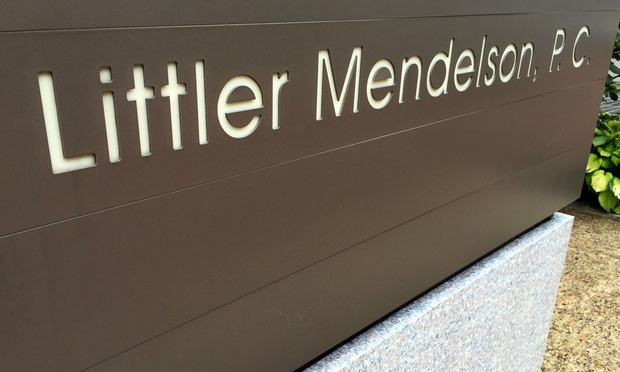Some Companies Slow to Embrace #MeToo Workplace Changes: Littler Survey
A majority of the respondents, 66 percent, ranked sexual harassment as a top issue on their radar.
May 02, 2018 at 12:39 PM
4 minute read
 Littler Mendelson offices in Portland, Maine. Photo: Diego M. Radzinschi/ALM
Littler Mendelson offices in Portland, Maine. Photo: Diego M. Radzinschi/ALM
Sexual harassment is a top concern for many employers and has sparked new trainings and updated handbooks. But only a fraction of companies have implemented new tools to address complaints, and a quarter of employers have made no changes in the wake of the #MeToo movement, according to an annual Littler Mendelson workplace survey.
The 2018 Littler Annual Employer Survey, with responses from more than 1,000 in-house counsel, human resources and C-suite executives, said company leaders are paying attention to the headline-grabbing sexual harassment allegations and associated employee firings and corporate apologies.
The survey also found employers are concerned about pay equity issues, whistleblowing and data protection. Companies are also closely watching how the Trump administration moves on the regulatory front, but more immediate compliance issues are coming from the growing web of state and local laws.
The majority of the respondents, 66 percent, ranked sexual harassment as a top issue on their radar. More than half, 55 percent, said they added training for supervisors and employees, and 38 percent have updated human resource policies or handbooks. Yet, only 13 percent have implemented new tools or investigation procedures to manage employee complaints and 24 percent have made no changes, the survey found.
“Sexual harassment in the workplace is not new,” said Helene Wasserman, co-chair of Littler's litigation and trials practice group. “What's interesting is that employers are worried because it's becoming so high-profile, especially with the media reports. They don't want to be the next headline.”
➤➤ Get employment law news and commentary straight to your in-box with Labor of Law, a new Law.com briefing. Learn more and sign up here.
Wasserman said 13 percent was a low percentage for companies to have implemented new techniques for investigating complaints. Many high-profile scandals centered around policies that critics claimed enabled powerful men to continue to sexually harass women. Wasserman said she has been recommending that her clients hire third-party investigators to look into cases before moving forward.
Gender pay equity was also a top concern, also sparked by headlines about pervasive gaps in wages and promotion practices across industries. The survey found that 41 percent ranked the issue as high concern.
Companies reported taking action: Nearly 60 percent said they conducted audits of current pay practices and salary data and 34 percent said they revised hiring practices and no longer ask about previous salaries during the application process. Only 14 percent have modified compensation policies or taken steps to facilitate advancement of female and minority employees.
Pay and promotion practices at major companies have been targeted in class actions, which have gained traction. Class actions have been certified to move forward against Google Inc. and Goldman Sachs this year, which both targeted practices that courts found could exacerbate the pay gap between women and men.
Companies are paying closer attention to state and local employment regulations more than what's happening at the federal level, according to the survey. About 75 percent of the respondents said they faced challenges with local laws, thanks to “policy vacuums at the federal level.”
“Companies want certainty more than anything,” said Michael Lotito, co-chair of Littler's Workplace Policy Institute. “The vast majority of employers want to comply with the law and the continuous reversals of federal workplace policy, as well as the increasingly fragmented and sometimes contradictory rules at the state and local level, is an enormous distraction for them.”
Regulatory uncertainty, Lotito said, “means inability to plan, budget and anticipate, and it requires constantly retraining employees and reformulating employment policies.”
Lotito said 195 new state laws were enacted last year, and compliance can vary with the state, particularly in progressive cities such as New York, Los Angeles and San Francisco. These changes leave companies constantly updating their handbook policies, he said, and lobbyists vying for state and local change, given federal standstill.
A majority of respondents, 64 percent, agree or strongly agree that “the shifting sands of workplace policies and regulations strain their businesses.”
Survey respondents said uncertainty poses challenges for making fundamental decisions. “It is difficult to set long-standing, well-thought-out policies when the rules change quickly,” one respondent said.
NOT FOR REPRINT
© 2025 ALM Global, LLC, All Rights Reserved. Request academic re-use from www.copyright.com. All other uses, submit a request to [email protected]. For more information visit Asset & Logo Licensing.
You Might Like
View All
NLRB Blisters Skilled Care Home Chain That Terminated Nursing Assistant Who Complained About Wages
6 minute read
Preparing for 2025: Anticipated Policy Changes Affecting U.S. Businesses Under the Trump Administration

Employers Race to File NLRB Petitions to Gain Upper Hand in Union Organizing
5 minute readTrending Stories
- 1State Budget Proposal Includes More Money for Courts—for Now
- 2$5 Million Settlement Reached With Stone Academy
- 3$15K Family Vacation Turned 'Colossal Nightmare': Lawsuit Filed Against Vail Ski Resorts
- 4Prepare Your Entries! The California Legal Awards Have a New, February Deadline
- 5DOJ Files Antitrust Suit to Block Amex GBT's Acquisition of Competitor
Who Got The Work
Michael G. Bongiorno, Andrew Scott Dulberg and Elizabeth E. Driscoll from Wilmer Cutler Pickering Hale and Dorr have stepped in to represent Symbotic Inc., an A.I.-enabled technology platform that focuses on increasing supply chain efficiency, and other defendants in a pending shareholder derivative lawsuit. The case, filed Oct. 2 in Massachusetts District Court by the Brown Law Firm on behalf of Stephen Austen, accuses certain officers and directors of misleading investors in regard to Symbotic's potential for margin growth by failing to disclose that the company was not equipped to timely deploy its systems or manage expenses through project delays. The case, assigned to U.S. District Judge Nathaniel M. Gorton, is 1:24-cv-12522, Austen v. Cohen et al.
Who Got The Work
Edmund Polubinski and Marie Killmond of Davis Polk & Wardwell have entered appearances for data platform software development company MongoDB and other defendants in a pending shareholder derivative lawsuit. The action, filed Oct. 7 in New York Southern District Court by the Brown Law Firm, accuses the company's directors and/or officers of falsely expressing confidence in the company’s restructuring of its sales incentive plan and downplaying the severity of decreases in its upfront commitments. The case is 1:24-cv-07594, Roy v. Ittycheria et al.
Who Got The Work
Amy O. Bruchs and Kurt F. Ellison of Michael Best & Friedrich have entered appearances for Epic Systems Corp. in a pending employment discrimination lawsuit. The suit was filed Sept. 7 in Wisconsin Western District Court by Levine Eisberner LLC and Siri & Glimstad on behalf of a project manager who claims that he was wrongfully terminated after applying for a religious exemption to the defendant's COVID-19 vaccine mandate. The case, assigned to U.S. Magistrate Judge Anita Marie Boor, is 3:24-cv-00630, Secker, Nathan v. Epic Systems Corporation.
Who Got The Work
David X. Sullivan, Thomas J. Finn and Gregory A. Hall from McCarter & English have entered appearances for Sunrun Installation Services in a pending civil rights lawsuit. The complaint was filed Sept. 4 in Connecticut District Court by attorney Robert M. Berke on behalf of former employee George Edward Steins, who was arrested and charged with employing an unregistered home improvement salesperson. The complaint alleges that had Sunrun informed the Connecticut Department of Consumer Protection that the plaintiff's employment had ended in 2017 and that he no longer held Sunrun's home improvement contractor license, he would not have been hit with charges, which were dismissed in May 2024. The case, assigned to U.S. District Judge Jeffrey A. Meyer, is 3:24-cv-01423, Steins v. Sunrun, Inc. et al.
Who Got The Work
Greenberg Traurig shareholder Joshua L. Raskin has entered an appearance for boohoo.com UK Ltd. in a pending patent infringement lawsuit. The suit, filed Sept. 3 in Texas Eastern District Court by Rozier Hardt McDonough on behalf of Alto Dynamics, asserts five patents related to an online shopping platform. The case, assigned to U.S. District Judge Rodney Gilstrap, is 2:24-cv-00719, Alto Dynamics, LLC v. boohoo.com UK Limited.
Featured Firms
Law Offices of Gary Martin Hays & Associates, P.C.
(470) 294-1674
Law Offices of Mark E. Salomone
(857) 444-6468
Smith & Hassler
(713) 739-1250







